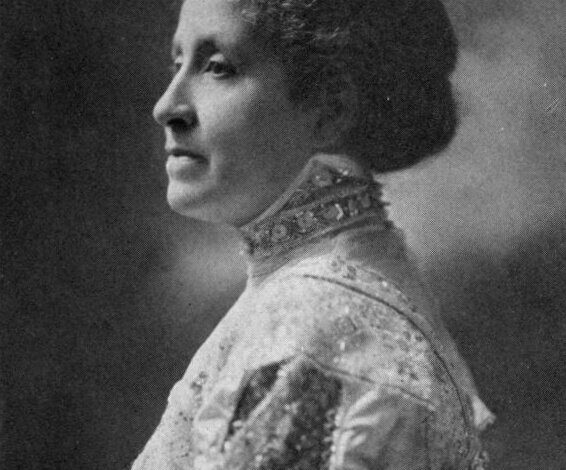Black Suffragist and Civil Rights Activist (U.S. National Park Service)

Alison M. Parker is Chair & Richards Professor of American History at the University of Delaware. She has research and teaching interests in U.S. women’s and gender history, African American history, and legal history. She majored in art history and history at the University of California, Berkeley and earned a PhD in history from the Johns Hopkins University. In 2017-2018, Parker was an Andrew W. Mellon Advanced Fellow at the James Weldon Johnson Institute for the Study of Race and Difference at Emory University, where she worked on her biography of the civil rights activist and suffragist Mary Church Terrell. Her book, Unceasing Militant: The Life of Mary Church Terrell is forthcoming from the University of North Carolina Press, in its John Hope Franklin Series in African American History and Culture. Parker is the author of, among other publications, Articulating Rights: Nineteenth-Century American Women on Race, Reform, and the State (2010) and Purifying America: Women, Cultural Reform, and Pro-Censorship Activism, 1873-1933 (1997). Parker also serves as co-editor of the Gender and Race in American History book series for the University of Rochester Press. As Chair of the History Department at the University of Delaware, Parker is committed to helping to build a coalition of students, faculty, and staff promoting a wide-ranging anti-racism agenda.
Footnotes
[1] Mary Church Terrell (MCT), A Colored Woman in a White World [hereafter, Colored], 144. [2] MCT, Colored, 143, 145. [3] See Salem, To Better, 14–27; White, Too Heavy, 27–29. [4] Quote from Terborg-Penn, African, 88, 95. [5] MCT Diary, November 4, 1909, MCTP, LOC, Reel 1. [6] Julius F. Taylor, “The Equal Suffrage Parade was Viewed by Many Thousand People From All Parts of the United States. No Color Line Existed in Any Part of It. Afro-American Women Proudly Marched Right By the Side of the White Sisters,” Broad Ax, Vol. 18, N. 23, March 8, 1913, 1; and “Illinois Women Feature Parade: Delegation from This State Wins High Praise by Order in Marching. Cheered by Big Crowd. Question of Color Line Threatens for While to Make Trouble in Ranks,” Chicago Daily Tribune, March 4, 1913, 3. [7] MCT, Colored, 316-317. [8] See Cott, “Feminist,” 51–54. [9] MCT Diary, November 12, 1909, MCTP, Library of Congress, Reel 2. [10] MCT Diary, Thursday, February 10, 1921, Oberlin College Archives. [11] MCT Diary, February 10, 11, & 14, 1921, Oberlin College Archives. [12] MCT Diary, January 21, 1921; and February 17, 1921, Oberlin College Archives. [13] MCT Diary, February 17, 1921, Oberlin College Archives. [14] Darlene Clark Hine suggests white Americans’ racism made them view as “unimaginable the possibility that a Black woman could be raped, sexually exploited, or harassed.” Hine, “For Pleasure, Profit, and Power,” 101; Brown, “Imaging Lynching,”169; Crenshaw and Ritchie, Say Her Name; Feimster, Southern Horrors, 158; Southard, Militant Citizenship, 181–83; MCT, Colored, 316–17. MCT Diary, February 17, 18, 1921, Oberlin College Archives. [15] MCT Diary, Friday, February 18, 1921; and MCT Diary, April 2, 1949, Oberlin College Archives.Bibliography
Brown, Elsa Barkley. “Imaging Lynching: African American Women, Communities of Struggle, and Collective Memory.” In African American Women Speak Out on Anita Hill–Clarence Thomas, edited by Geneva Smitherman, 100–124. Detroit, Mich.: Wayne State University Press, 1995.
Chicago Daily Tribune. “Illinois Women Feature Parade: Delegation from This State Wins High Praise by Order in Marching. Cheered by Big Crowd. Question of Color Line Threatens for While to Make Trouble in Ranks.” March 4, 1913, 3.
Cott, Nancy F. “Feminist Politics in the 1920s: The National Woman’s Party.” Journal of American History 71, no. 1 (June 1984): 43–68.
Crenshaw, Kimberle, and Andrea J. Ritchie. Say Her Name: Resisting Police Brutality against Black Women. New York: African American Policy Forum, 2015.
Feimster, Crystal N. Southern Horrors: Women and the Politics of Rape and Lynching. Cambridge, Mass.: Harvard University Press, 2009.
Hine, Darlene Clark. “For Pleasure, Profit, and Power: The Sexual Exploitation of Black Women.” African American Women Speak Out on Anita Hill-Clarence Thomas, edited by Geneva Smitherman, 168–77. Detroit, Mich.: Wayne State University Press, 1995.
Murray, Ella Rush. “The National Woman’s Party and the Violation of the Nineteenth Amendment,” The Crisis, 21:6 (April 1921): 259-261.
Salem, Dorothy. To Better Our World: Black Women in Organized Reform, 1890–1920. Brooklyn, N.Y.: Carlson, 1990.
Southard, Belinda A. Stillion. Militant Citizenship: Rhetorical Strategies of the National Woman’s Party. College Station: Texas A&M University Press, 2011.
Taylor, Julius F. “The Equal Suffrage Parade was Viewed by Many Thousand People from All Parts of the United States. No Color Line Existed in Any Part of It. Afro-American Women Proudly Marched Right by the Side of the White Sisters,” Broad Ax, Vol. 18, N. 23, March 8, 1913, 1.
Terborg-Penn, Rosalyn. African-American Women in the Struggle for the Vote, 1850–1920. Bloomington: University of Indiana Press, 1998.
Terrell, Mary Church. A Colored Woman in a White World. Washington, D.C.: Ransdell, 1940; reprinted and revised, National Association of Colored Women’s Clubs Inc.,1968.
———. 1909 Diary, Mary Church Terrell Papers, Library of Congress, Reel 1.
———. 1921 Diary & 1949 Diary, Mary Church Terrell Papers, Oberlin College Archives.
White, Deborah Gray. Too Heavy a Load: Black Women in Defense of Themselves, 1894–1994. New York: W. W. Norton, 1999.
Source link




